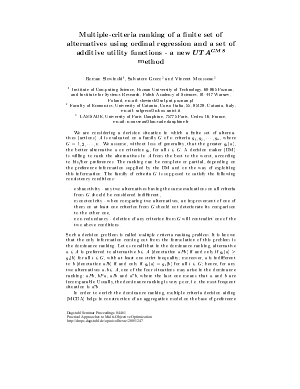Multi-criteria ranking of a finite set of alternatives using ordinal regression and additive utility functions - a new UTA-GMS method
Authors Roman Slowinski, Salvatore Greco, Vincent Mousseau
-
Part of:
Volume:
Dagstuhl Seminar Proceedings, Volume 4461
Part of: Series: Dagstuhl Seminar Proceedings (DagSemProc) - License:
 Creative Commons Attribution 4.0 International license
Creative Commons Attribution 4.0 International license
- Publication Date: 2005-08-10
File

PDF
DagSemProc.04461.12.pdf
- Filesize: 310 kB
- 4 pages
Document Identifiers
Subject Classification
Keywords
- Multiple-criteria ranking
- ordinal regression
- partial preorder
- UTA-like method
Metrics
- Access Statistics
-
Total Accesses (updated on a weekly basis)
0Document
0Metadata
Abstract
UTA-GMS is a new method for assessment of strong or weak outranking relation in a problem of multi-criteria ranking, proposed by the authors. The ranking concerns a finite but relatively large set of alternatives A. We assume indirect preference information supplied by the decision maker (DM) in form of a complete preorder on a subset of reference alternatives R, called reference preorder. The preference model build from this information is an additive value function. The technique of passing from reference preorder to compatible additive value functions is called ordinal regression and it is well known from the UTA method proposed by Jacquet-Lagreze and Siskos in 1982. Unlike in the UTA method, we take into account all compatible value functions (instead of one or several most characteristic) at the stage of ranking the whole set A of alternatives. Moreover, we do not impose the additive value function to have piecewise-linear components but we accept any additive form. The resulting relations in A are twofold: strong outranking (if alternative x has greater value than y for all compatible value functions) and weak outranking (if alternative x has greater value than y for at least one compatible value function). Strong outranking is a partial preorder and weak outranking is a complete preorder in A. The strong outranking is of particular interest for the DM – it corresponds to dominance relation when the set of reference alternatives is empty, and to a complete preorder relation when the reference ranking is compatible with a single value function only. This approach has several interesting extensions useful for practical applications. The method has been implemented for a PC and will be presented together with an example of application.
Cite As Get BibTex
Roman Slowinski, Salvatore Greco, and Vincent Mousseau. Multi-criteria ranking of a finite set of alternatives using ordinal regression and additive utility functions - a new UTA-GMS method. In Practical Approaches to Multi-Objective Optimization. Dagstuhl Seminar Proceedings, Volume 4461, pp. 1-4, Schloss Dagstuhl – Leibniz-Zentrum für Informatik (2005)
https://doi.org/10.4230/DagSemProc.04461.12
BibTex
@InProceedings{slowinski_et_al:DagSemProc.04461.12,
author = {Slowinski, Roman and Greco, Salvatore and Mousseau, Vincent},
title = {{Multi-criteria ranking of a finite set of alternatives using ordinal regression and additive utility functions - a new UTA-GMS method}},
booktitle = {Practical Approaches to Multi-Objective Optimization},
pages = {1--4},
series = {Dagstuhl Seminar Proceedings (DagSemProc)},
ISSN = {1862-4405},
year = {2005},
volume = {4461},
editor = {J\"{u}rgen Branke and Kalyanmoy Deb and Kaisa Miettinen and Ralph E. Steuer},
publisher = {Schloss Dagstuhl -- Leibniz-Zentrum f{\"u}r Informatik},
address = {Dagstuhl, Germany},
URL = {https://drops.dagstuhl.de/entities/document/10.4230/DagSemProc.04461.12},
URN = {urn:nbn:de:0030-drops-2476},
doi = {10.4230/DagSemProc.04461.12},
annote = {Keywords: Multiple-criteria ranking, ordinal regression, partial preorder, UTA-like method}
}
